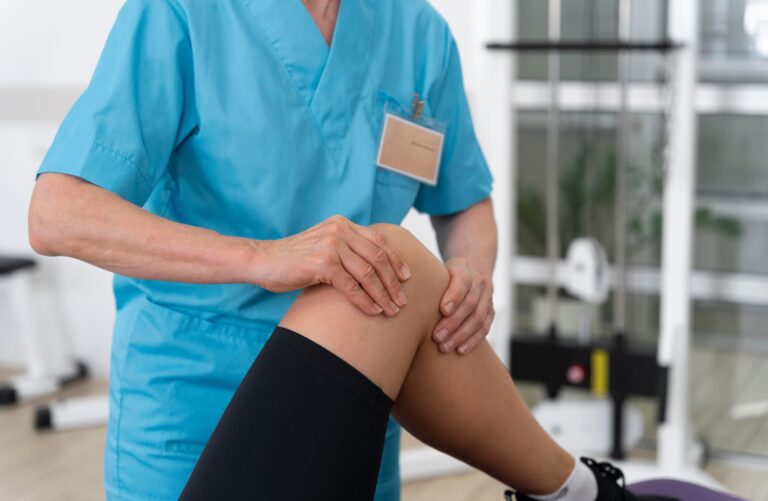
Knee pain can make even simple activities, like climbing stairs or walking, feel like a challenge. For many, this pain stems from arthritis, joint wear, or old injuries that limit movement and quality of life. When medications, therapy, or injections no longer help, knee replacement surgery becomes a reliable solution to regain mobility and live pain-free.
This comprehensive guide walks you through what knee replacement surgery involves, how to prepare, what recovery looks like, and how to choose the best hospital for knee replacement surgery in Pune to ensure the best possible outcome.
Key Takeaways
- Knee replacement surgery replaces damaged parts of the knee joint with artificial implants to restore movement and reduce pain.
- Proper pre-surgery preparation and post-surgery care are crucial for a smooth recovery.
- Choosing the right orthopedic surgeon and hospital ensures a safer procedure and faster rehabilitation.
- Recovery can take 6-12 weeks, depending on the patient’s age, fitness, and overall health.
- Following your physiotherapy plan plays a major role in regaining strength and flexibility.
Table of Contents
1. What Is Knee Replacement Surgery?
Knee replacement surgery, also called knee arthroplasty, is a medical procedure in which a damaged or worn-out knee joint is replaced with an artificial implant (prosthesis).
The procedure aims to:
- Relieve chronic knee pain
- Improve mobility
- Correct deformities
- Enhance overall quality of life
Surgeons replace the damaged surfaces of the bones that form the knee joint (femur, tibia, and sometimes patella) with metal and plastic components designed to mimic natural movement.
2. When Do You Need Knee Replacement Surgery?
Knee replacement isn’t the first step in treatment. It’s recommended only when conservative options, like medications, physical therapy, or lifestyle changes, don’t provide relief.
If you have any of the following symptoms, you might benefit from knee replacement surgery:
- Severe knee pain that limits daily activities
- Difficulty walking, climbing stairs, or sitting
- Chronic knee stiffness and swelling
- Deformity of the knee joint (bowing in or out)
- Ineffective pain management with medicines or physiotherapy
Common medical conditions that lead to knee damage include:
- Osteoarthritis (age-related joint wear)
- Rheumatoid arthritis (autoimmune joint inflammation)
- Post-traumatic arthritis (after an injury)
3. Types of Knee Replacement Surgery
Depending on the extent of damage, surgeons may recommend one of the following:
1. Total Knee Replacement (TKR)
The most common procedure is where both sides of the knee joint are replaced with artificial implants. Ideal for patients with severe arthritis or joint degeneration.
2. Partial Knee Replacement (PKR)
Only the knee’s damaged part is replaced. Suitable for younger or active patients with localized arthritis.
3. Bilateral Knee Replacement
Both knees are replaced at the same time, recommended for patients with damage in both joints.
4. Robotic-Assisted Knee Replacement
Advanced technology that uses precision tools to ensure accurate implant placement, leading to faster recovery and less post-surgery pain.
4. Preparing for Surgery
Preparation plays a vital role in ensuring a safe surgery and a smooth knee replacement surgery recovery.
Medical Evaluation
Your orthopedic surgeon will conduct blood tests, X-rays, and ECGs to ensure you’re fit for surgery.
Lifestyle Adjustments
- Stop smoking and limit alcohol intake.
- Maintain a healthy diet with iron, calcium, and protein-rich foods.
- Practice light exercises to strengthen muscles around the knee.
Home Preparation
Arrange your living space for easy movement post-surgery:
- Keep essentials within reach.
- Install handrails in bathrooms.
- Remove obstacles or rugs that could cause tripping.
5. The Knee Replacement Surgery Procedure
The procedure typically lasts 1 to 2 hours and involves the following steps:
- Anesthesia: You’ll receive either spinal or general anesthesia.
- Incision: To reach the joint, a little incision is made over the knee.
- Removal of Damaged Tissue: The surgeon removes worn cartilage and bone.
- Implant Placement: Artificial components made of metal and medical-grade plastic are fitted precisely.
- Closure: A sterile dressing is applied once the incision is closed.
Modern surgical techniques ensure minimal blood loss and smaller incisions, which help with quicker recovery.
6. Recovery and Rehabilitation
Knee replacement surgery recovery is a gradual process that involves consistent physiotherapy and lifestyle care.
Immediate Post-Surgery (0-2 Days)
- Pain management through medication
- Early mobilization under guidance
- Monitoring for infection or swelling
Short-Term Recovery (2-6 Weeks)
- Physiotherapy sessions to restore strength and flexibility
- Walking aids like crutches or walkers are used temporarily
- Gradual increase in movement and exercises
Long-Term Recovery (6-12 Weeks and Beyond)
- Most patients resume normal daily activities
- Driving and light exercises become possible
- Regular follow-ups ensure implant stability
Full recovery may take 3 to 6 months, depending on your health and post-surgery discipline.
7. Choosing the Best Hospital for Knee Replacement Surgery in Pune
Selecting the right medical facility can significantly influence your recovery and outcome.
When looking for the best hospital for knee replacement surgery in Pune, consider the following:
- Experienced orthopedic surgeons specializing in joint replacements
- Advanced operating theaters equipped with robotic-assisted systems
- Dedicated rehabilitation and physiotherapy departments
- Patient-focused care and post-surgical support
Hospitals that follow a multidisciplinary approach, combining surgical expertise, physiotherapy, and nutrition, tend to deliver the best results.
8. Tips for a Smooth Recovery
- Follow your physiotherapist’s instructions carefully.
- Take prescribed medications on time.
- Keep the incision area clean and dry.
- Avoid twisting or putting unnecessary weight on the operated leg.
- Eat a balanced diet with protein, vitamin D, and calcium to promote healing.
- Stay positive and consistent with exercises; it greatly impacts your progress.
9. Life After Knee Replacement Surgery
A successful knee replacement can last 15-20 years, allowing patients to lead active, pain-free lives.
You can expect:
- Improved mobility and balance
- Relief from chronic pain
- Ability to return to light sports or hobbies
- Enhanced mental well-being and confidence
However, it’s important to avoid high-impact activities such as running or jumping, which can wear down the implant.
Final Thoughts
Knee replacement surgery can be life-changing for those suffering from chronic knee pain or limited mobility. By understanding the process, recovery, and lifestyle changes involved, you can make an informed decision and set realistic expectations for your journey to pain-free living.
Remember, your recovery depends not only on surgical precision but also on your commitment to physiotherapy and healthy habits.
If you’re considering this procedure, consult a trusted orthopedic specialist at a reputable center. Expert care can make all the difference in regaining strength, mobility, and confidence.
If you’re experiencing chronic knee pain or are planning to explore knee replacement surgery recovery options, visit our Advanced Orthopedic Department today. Our specialists in Pune provide comprehensive care, from diagnosis to rehabilitation, ensuring safe and successful knee replacements.
Learn more about our Orthopedic Services
FAQs
How long does knee replacement surgery take?
The procedure usually takes about 1 to 2 hours, depending on the complexity and the type of implant used.
What is the recovery time after knee replacement surgery?
Most patients recover within 6 to 12 weeks, although complete healing and muscle strengthening may take up to 6 months.
Can I walk immediately after knee replacement surgery?
Yes, patients are encouraged to start walking with assistance within 24 to 48 hours post-surgery under medical supervision.
Are there risks involved in knee replacement surgery?
As with any surgery, there are minor risks like infection, blood clots, or implant loosening, but these are rare with modern techniques and proper care.
Which is the best hospital for knee replacement surgery in Pune?
Look for a hospital that offers advanced orthopedic care, experienced surgeons, and rehabilitation support, such as Pentagon Multispeciality Hospital in Wakad.
What activities should I avoid after surgery?
Avoid running, jumping, or heavy lifting to protect the implant and ensure long-term success.
We look forward to assisting you with your healthcare needs.
Just Make an Appointment
and You’re Done!


